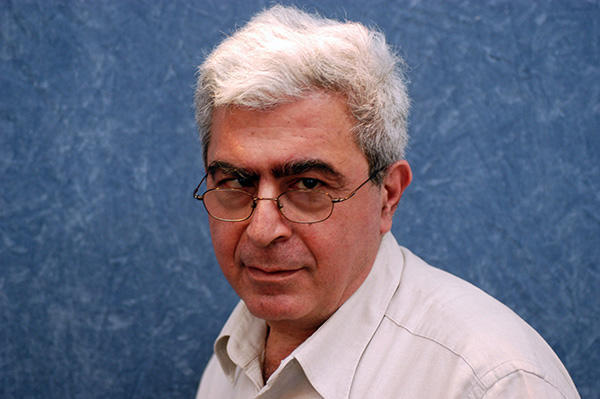
White Masks
By Elias Khoury
Archipelago Books, 2010
It’s a testament to the uncanny sense of immediacy that Elias Khoury’s White Masks creates that it seems impossible that it should have been written nearly three decades ago. (Although newly translated into English, the novel, Khoury’s first, appeared in Arabic in 1981.) There’s nothing dated about White Masks. Because it’s told so close to the ground, the emotion feels universal, timeless; the violence that sets the story in motion, and that inflects the myriad lives that crowd their way into the book, seems completely contemporary. All this, despite, or perhaps because of, Khoury’s signature style, the grand swirling of characters, the digressions and stories within stories, the lack of resolution.
Khoury’s unnamed narrator (and likely authorial stand-in) is a sociology graduate and would-be journalist who, “owing to ‘prevailing circumstances,’” can’t find a job as a writer. He whiles away his days working at a travel agency, issuing the odd ticket and staring blankly at his computer. One morning, he comes across a newspaper headline, “Dreadful murder in the UNESCO district.” He grows obsessed with the case, perhaps in part because the tortured body is found near the statue of Habib Abi Shahla, one of the primary architects of Lebanon’s independence. The deceased was an ordinary postal worker named Khalil Ahmad Jaber. “Although I tried, I couldn’t place the man’s name, but I seemed to remember that I had come across him somewhere,” explains the narrator. That Khalil Ahmad Jaber is almost certainly no one of great import — not a rebel fighter, an intellectual of any renown, or even somebody’s lover — makes White Masks all the more affecting: lives like his will never be remembered. “This is no tale,” Khoury writes, at the beginning and at the end.
Our narrator sets out to collect any information he possibly can about Jaber. These “documents” make up the majority of the book. Jaber, it seems, was last seen tearing down the posters of martyrs pasted on city walls, even though, or perhaps because, his own son, a promising boxer, had recently been killed in combat. As the narrator shifts from interview to interview — with Jaber’s bewildered wife and bitter daughter, an embattled building caretaker who tried to help him on the street, and a maimed combatant who met him for only ten minutes — the book turns into a series of testimonies. For this reason, much of it reads like conversation rather than prose, with all the repetitive and, at times, tedious patterns of speech. “Oh, Lord, Lord, this is it, the final reckoning, the Day of Judgment, the day we always feared and expected… and now it has come,” Jaber’s wife Noba begins. “And now, dear God, how do you expect me to manage — me a poor widow, all alone? What will people say?… The devil take them!… Forgive me, God!”
Khoury once explained to the literary magazine Banipal that a writer, for him, is “someone like a storyteller, a hakawati, or a narrator in the Maqamat or in the Thousand and One Nights. The writer is only a medium. He is a medium between the direct experience of life and the imaginary, between memory and the future, between the written and spoken language, between the possibilities of language itself.” I would have preferred more writer in this book, less medium. But Khoury’s style does propel us into each of these lives at an appealingly brisk pace, not only because we wish to discover who killed Jaber — who tortured him, shot him, and left his body in a trash heap — but because of the desperation with which they recount their hellish realities. We also wish to know what will happen to each of them; their personal experiences provide a tiny snapshot of the total disintegration of a society: families are displaced, fathers killed, women raped, honor corrupted. Though we hear some details of Jaber’s life from his wife, Jaber himself becomes almost incidental to the story.
Of those characters, Fahd Badreddin, the leftist fighter, emerges as the most dazzling, his chapter the most novelistic of the bunch. Fahd met Jaber for all of ten minutes, and clearly their relationship serves only to draw a connection between the fighter and death. Jaber’s “smell was the worst thing about him,” Fahd explains. “That smell, oh, the smell was so awful, like the smell that time on the mountaintop, so faraway….” Jaber’s smell reminds him of his own brush with death. He recalls how he lost an eye in the mountains, witnessed the unjust killing of an enemy, and returned from a Madrid hospital unable to continue with the struggle. The party suggests Fahd become part of a propaganda film, and from this Khoury spins pitch-perfect parodies of leftist propaganda.
“The cinema is such a fabulous thing,” says a pretty woman, trying to persuade Fahd to participate, “the way it can lend grandeur to events. Imagine, for instance, a sequence on Tel al-Zaatar. Women, children, wailing and sobbing, the camera panning from face to face, zooming in on this cute kid with large black eyes and curly hair who’s picking his nose; the kid is totally unaware of what’s going on, as if he were unseeing, unhearing. Now wouldn’t that be fabulous?”
“Yes, that would be very powerful, it’d be really great.”
“And imagine… just think in what original ways we could portray death! Let’s assume, for instance, that we’re filming a corpse somewhere in the old downtown: the corpse is surrounded by overgrown weeds and grasses and a high earth embankment. The camera rolls silently, stops at the corpse, then cuts to a wild flower growing among the weeds. Wouldn’t that be absolutely beautiful?”
This passage demonstrates another aim of Khoury’s project — to render death not only at its most grotesque, but at its most inconsequential. Unlike the beautiful corpse shrouded in flowers, Khalid Ahmad Jaber is simply dead.